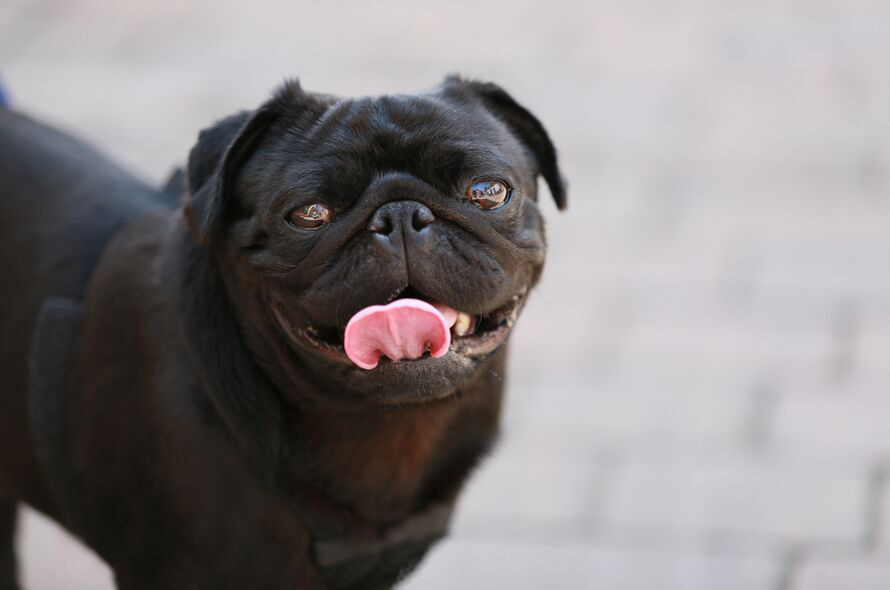We asked Claire Turner, part of our brilliant Clinic team, to tell us about a growing health issue for dogs.
At Battersea we welcome dogs in all shapes and sizes looking for another chance to find loving homes. But there’s a particular group of dogs that we are seeing in increasing numbers, which carry with them some concerning issues.
These are “brachycephalic”, or flat-faced dogs, such as English Bulldogs, Pugs and French Bulldogs. These breeds have become hugely popular over recent years, and particularly since the beginning of the COVID-19 pandemic have continued to fetch high prices on pet selling websites. With their big eyes and loveable personalities, it isn’t hard to see why. So, what’s the problem with these adorable dogs?

A struggle to breathe
The most extreme brachycephalic features, such as very short muzzles and flat faces, leave no space for airflow through the nasal cavity. Whilst not all flat-faced dogs will have such extreme features or face difficulties, we have seen a concerning increase in breathing problems in these dogs, known as Brachycephalic Obstructive Airway Syndrome (BOAS).
Next time you see a Pug, Bulldog or Frenchie, take a look at their nostrils. All the spaces between the bones of the nasal cavity are squashed together to produce that tiny button nose, so the dog is forced to breathe with its mouth open. This constant panting and gasping for air is exhausting and puts a huge amount of pressure on the tissues at the back of the throat, creating snorting and snoring noises.
The soft palate, which sits at the back of the throat, has no space and hangs down across the top of the windpipe, causing more obstruction and back pressure. And that’s not all. For many of these dogs the windpipe itself is abnormally narrow. When we anaesthetise a brachycephalic dog, we know we won’t be able to get a normal sized tube in their airway- it would be the equivalent of us breathing through a drinking straw.
We are now routinely performing surgery for “BOAS” at Battersea, which involves widening the nostrils, shortening the soft palate and removing laryngeal ventricles (fleshy swellings in the top of the airway caused as a result of the constant suction pressure on the larynx). In some cases, sadly the condition is too advanced, which means the dog collapses as soon as they attempt any kind of activity.
Hard to swallow
Airway problems aren’t the only issue flat-faced dogs are struggling with. Many suffer from digestive issues which can cause them to regurgitate food, such as hiatal hernia where the stomach slips up through the diaphragm into the chest.
This combination of laboured breathing and regurgitation also means that brachycephalic dogs can breathe regurgitated food into their lungs, which can be fatal.
Skin deep
Flat-faced breeds are also more likely to suffer from skin diseases caused by allergies to a variety of environmental triggers. This often requires life-long medication to manage itchiness and infections. For some Bulldogs, the deep skin folds in different areas of their body are a hotbed for yeasts and bacteria, which can cause chronic skin disease.
Eye can't see
Short muzzles and shallow eye sockets mean brachycephalic dogs are more prone to eye disease. Their bulging eyes are at higher risk of scratches, ulcers and perforations, and of “proptosis” where the whole globe of the eye comes out from the socket.
Sometimes their eyes bulge so much that their eyelids can’t close fully when they blink. This can lead to their corneas drying out, called ‘exposure keratitis’, which causes discomfort and clouding of the surface of the eye.
How can I help my dog?
If you have a dog suffering from signs of BOAS, first seek advice from your vet. Each dog will need an individual assessment. But in general owners should consider:
- Keeping your dog at a healthy weight for their size will reduce extra strain when breathing
- Walking on a harness helps spread pressure across the chest and so it is not focussed on the neck.
- Flat-faced dogs are at increased risk of heat stroke so be aware of things like the outside temperature when you take them for a walk
- There are medical treatments for regurgitation and acid reflux which can help
How can we tackle this issue?
This is fundamentally a supply and demand issue. If dogs with extremely flat faces and tiny nostrils remain in demand, then the related health concerns will continue to cause suffering to innocent dogs.
If you or someone you know is thinking about getting a dog, my advice is to please give consideration to the potential health issues in brachycephalic breeds. We’d strongly encourage anyone to consider getting a rescue dog first, where you’ll be aware of any pre-existing medical issues they may have. However, if you are adamant on buying a puppy, please ensure you go to a responsible breeder where dogs are health tested and the wellbeing of the parents and puppies is a priority.
For more information visit: https://www.vet.cam.ac.uk/boas/about-boas

